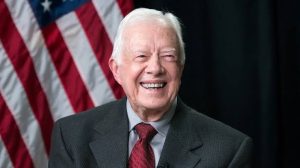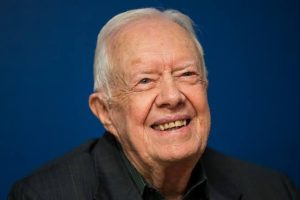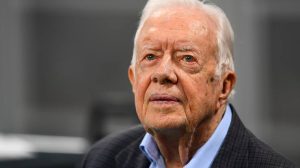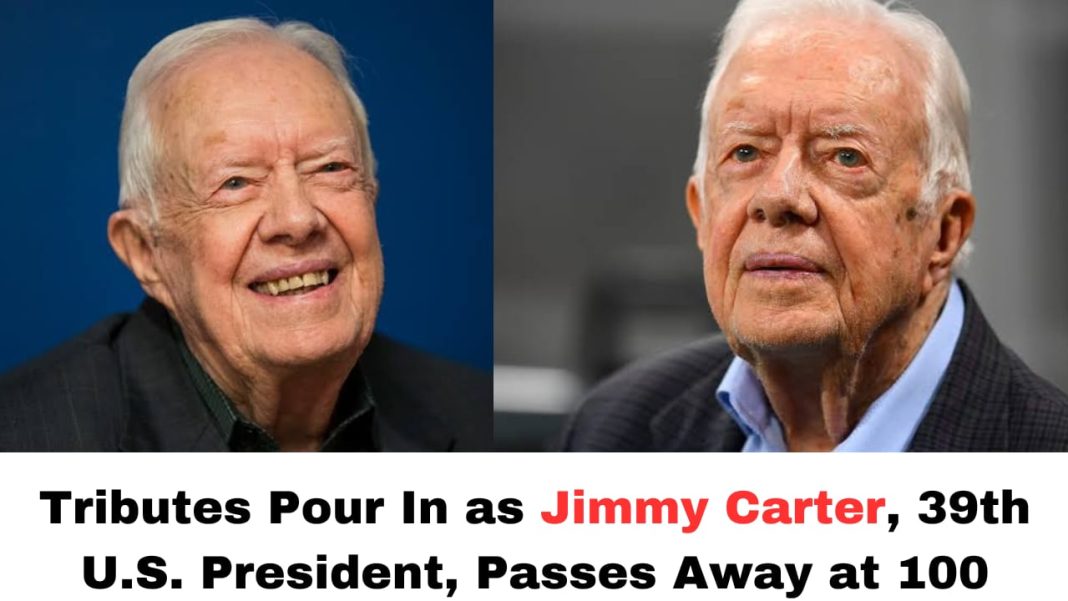Digital News Guru New Delhi Desk:
Jimmy Carter: A Life of Service, Leadership, and Legacy
James Earl Carter Jr., the 39th President of the United States, is remembered as one of the most significant figures in modern American history, not only for his time in the White House but also for his extraordinary humanitarian efforts in the years that followed. Born on October 1, 1924, in Plains, Georgia, Carter’s life has been one of commitment to peace, human rights, and social justice. His unique leadership style and unwavering dedication to improving the world have left a lasting legacy. As Carter passed away at the age of 100 on December 29, 2024, the world paused to reflect on the profound impact of his life.
Early Life and Career
Carter’s upbringing in the rural South deeply influenced his worldview. Growing up in the small town of Plains, he was raised in a close-knit family that valued hard work, integrity, and community. His father, Earl Carter, was a successful businessman and farmer, while his mother, Lillian Carter, was a nurse who became known for her humanitarian work, particularly in India as a Peace Corps volunteer. The lessons Carter learned from his parents about empathy, service, and the importance of giving back would stay with him throughout his life.

Carter attended the United States Naval Academy and graduated in 1946, serving in the U.S. Navy as a submariner. His time in the military helped shape his leadership skills, which would later define his presidency. After his military service, Carter returned to Georgia, where he managed the family farm and became involved in local politics. In 1962, he entered the political arena, winning a seat in the Georgia Senate. His political career soon gained momentum, and in 1970, he was elected governor of Georgia.
As governor, Carter implemented progressive policies that focused on environmental protection, civil rights, and government reform. He famously worked to eliminate racial segregation in the state’s schools and government offices. His push for transparency and reform in Georgia set the stage for his bid for the presidency.
The Presidency of Jimmy Carter (1977–1981)
Carter’s rise to national prominence culminated in his successful bid for the presidency in 1976. Running as a political outsider, he appealed to voters frustrated with the corruption and scandal surrounding the Nixon administration and Gerald Ford’s pardoning of Nixon. Carter promised to restore honesty, integrity, and morality to the White House. His campaign focused on human rights, environmental conservation, and a more balanced foreign policy.
Once in office, Carter faced a host of domestic and international challenges. Domestically, his administration struggled with inflation, unemployment, and an energy crisis. Carter’s response was the creation of the Department of Energy and the implementation of policies aimed at reducing U.S. dependence on foreign oil. His most significant achievement in domestic policy, however, may have been his focus on human rights. Carter’s human rights agenda led to significant diplomatic efforts to support oppressed people worldwide, including advocating for the independence of African nations and speaking out against Soviet abuses.
On the international stage, Carter is perhaps best remembered for brokering the Camp David Accords in 1978. This landmark peace agreement between Egypt and Israel, which led to Egypt’s recognition of Israel and Israel’s withdrawal from the Sinai Peninsula, earned Carter widespread praise and a Nobel Peace Prize nomination. His ability to mediate between two long-time adversaries was a testament to his diplomatic skills and his commitment to peace.

However, Carter’s presidency was not without its setbacks. The U.S. economy continued to struggle with stagflation, and the Iran hostage crisis in 1979, in which 52 American diplomats were held captive in Tehran for 444 days, severely damaged his political standing. Despite his efforts to negotiate the hostages’ release, the crisis and the broader geopolitical challenges of the time led to Carter’s defeat in the 1980 presidential election by Ronald Reagan.
Post-Presidency: A Lifetime of Humanitarian Work
While many former presidents retreat from public life, Carter’s post-presidential years have been marked by extraordinary service to humanity. After leaving the White House, Carter focused on international diplomacy, human rights advocacy, and efforts to combat poverty and disease. In 1982, he founded the Carter Center in Atlanta, a nonprofit organization dedicated to advancing human rights and alleviating suffering.
The Carter Center’s work spans a variety of fields, including disease eradication, democracy promotion, and conflict resolution. Perhaps its most famous success is the eradication of smallpox, a campaign to which Carter contributed significantly through the World Health Organization. The Carter Center also played a major role in the efforts to combat Guinea worm disease, which has seen a dramatic decline thanks to Carter’s personal involvement and the center’s partnerships with local governments and health organizations.
Carter’s role as a global ambassador for peace further extended his legacy. He became known for his efforts to mediate conflicts around the world, from Central America to the Middle East. His work in Nicaragua, Ethiopia, and Haiti earned him accolades for his diplomatic skills, which were honed through years of working toward solutions that prioritized the welfare of ordinary people.
Perhaps Carter’s most notable personal achievement post-presidency is his long-standing commitment to Habitat for Humanity, an organization that builds homes for low-income families. Carter and his wife, Rosalynn, have spent countless hours volunteering with Habitat for Humanity, helping to build homes and raise awareness about the need for affordable housing. Their work with the organization has made them beloved figures among those who seek to improve communities through grassroots efforts.
Legacy and Reflections
Carter’s impact on the world extends far beyond his four years in office. His work with the Carter Center and his personal dedication to human rights, global health, and poverty alleviation are part of the enduring legacy he leaves behind. Though he was often considered a one-term president, his influence and reputation have only grown over time. His commitment to peace and justice, and his focus on public service, have earned him admiration from leaders of all political stripes.

As a former president, Carter also set an example of humility and integrity, choosing to live a modest life despite his worldwide influence. His example stands in stark contrast to many of his peers in the political realm, who often seek power and wealth after leaving office. Carter’s life is a testament to the power of service — not just as a politician, but as a global citizen committed to improving the lives of others.
Jimmy Carter’s death at the age of 100 marks the end of an era. As the world reflects on his legacy, one thing is clear: his life was defined not by political battles or achievements in the White House, but by his unrelenting commitment to helping others and making the world a better place. Jimmy Carter’s legacy will continue to inspire generations to come, proving that one person can indeed make a difference in the world.
You May Also Read: Wealth of India’s Chief Ministers: The Richest and the Poorest Revealed in ADR Report








